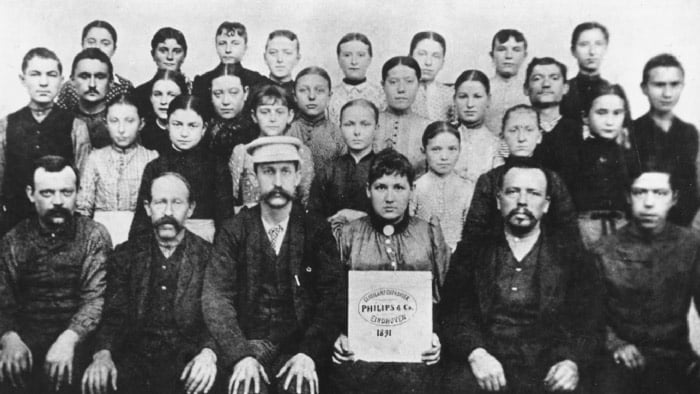When I think about technology that has shaped our lives over the past century, one name that immediately comes to mind is Philips. As one of the most recognized and trusted brands in the world, Philips' story is deeply intertwined with technological innovation and human progress. Through its vast portfolio of products—from light bulbs to medical devices—Philips has revolutionized industries and lives across the globe. In this article, I will walk you through the fascinating Philips company history, exploring its journey from a small Dutch enterprise to a multinational giant.
Interestingly, Philips has also played a crucial role in enhancing coffee experiences for consumers. With its Philips LatteGo 5400 Review and other advanced espresso machines, the company has made high-quality coffee more accessible to homes worldwide. In this article, I will walk you through the fascinating Philips company history, exploring its journey from a small Dutch enterprise to a multinational giant.
The Birth of Philips: A Humble Beginning
The Philips company history began in 1891 in Eindhoven, Netherlands, when Gerard Philips founded the company along with his father, Frederik. The company’s early days were focused on producing light bulbs, primarily carbon-filament lamps. The market for electric lighting was rapidly growing at the time, and Philips sought to capitalize on this opportunity. The creation of a factory to manufacture light bulbs was the first step toward what would become a multinational conglomerate.
Despite the promising start, Philips faced significant competition from established players. However, Gerard Philips, along with his brother Anton, managed to secure a steady flow of orders by focusing on high-quality products and innovative designs. This initial success was crucial in building the foundation for the company’s future.
Though the competition was fierce, Gerard and his brother Anton ensured the company’s success by prioritizing high-quality, innovative products. This strategy laid the groundwork for Philips to become a leader not just in lighting, but also in various other industries—including household appliances and, eventually, coffee machines like the Philips 3200 LatteGo Review, which brought high-end espresso-making technology to everyday consumers.
The Philips Expansion: A Journey of Growth and Diversification
As the company began to expand its reach, Philips ventured into new markets beyond light bulbs. During the early 20th century, the company started producing a variety of electrical appliances, including radios, which quickly gained popularity. By the 1920s, Philips had established itself as a leader in the European radio market. This marked a turning point in the Philips company history, as it began to diversify into electronics and home appliances.
Philips’ success was not limited to Europe; it soon expanded its operations internationally. In the 1930s, the company opened branches in several countries, including the United States. By this time, Philips had become a well-established player in the global electronics market, producing products that would eventually touch every facet of daily life.
This trend of diversification continued, and over the years, Philips introduced high-quality home appliances, including coffee machines that revolutionized the way people enjoy their morning brew. Today, consumers can compare models like the Philips 3200 vs 4300 and the Philips LatteGo 5400 vs 4300 to find the perfect coffee machine tailored to their preferences.

World War II and the Philips Resilience
The outbreak of World War II had a significant impact on the global economy and industries across Europe. Philips was no exception. The company’s factories in the Netherlands were occupied by the Nazis, and many of its employees were forced into labor. However, despite the challenges, Philips managed to maintain its operations in a limited capacity.
During the war, the company also made notable contributions to the Allied war effort. Philips supplied equipment for military communications and radar systems, helping to turn the tide of the war. The resilience of Philips during this challenging time became a testament to its strength and determination to overcome adversity.
Despite these hardships, Philips rebounded strongly after the war, focusing on innovation and expanding into new industries. This period also saw the company making strides in consumer appliances, particularly in coffee technology, leading to modern machines like the Philips 4300 LatteGo Review, which allows coffee lovers to enjoy barista-quality beverages at home.
Post-War Era: The Rise of Innovation and Consumer Products
After the war, the Philips company history entered a new phase, with the company focusing on post-war reconstruction and technological innovation. One of the most significant developments in the post-war era was the introduction of the Philips transistor radio, which revolutionized portable entertainment. The transistor radio allowed people to listen to their favorite music and news broadcasts anywhere, and it became a symbol of the new, consumer-oriented era.
Philips continued to diversify its product portfolio, expanding into various fields such as television, medical equipment, and household appliances. In the 1950s and 1960s, the company introduced groundbreaking innovations in consumer electronics, including color televisions and stereo systems. This period marked a golden age for Philips, as it solidified its reputation as an innovator in the electronics industry.
Philips also took great strides in coffee technology, ensuring that coffee enthusiasts could enjoy top-quality espresso with the touch of a button. Machines such as the Philips 3200 vs 5400 comparison show just how much the company has refined its espresso technology, making it easier for consumers to experience café-quality coffee at home.
Philips and the Digital Age: Advancing Technology for the Future
As the 20th century drew to a close, Philips faced new challenges brought on by the digital revolution. The rise of personal computers, the internet, and mobile technology reshaped industries and consumer behavior. Rather than shy away from these changes, Philips embraced them and shifted its focus toward digital technologies.
In the 1990s, the company began investing heavily in research and development, focusing on new technologies in areas such as semiconductors, digital displays, and consumer electronics. One of the company’s most significant achievements during this time was the development of the CD player and the introduction of the Compact Disc (CD), which revolutionized the music industry and brought high-quality digital audio to homes around the world.
Philips also expanded its focus beyond consumer electronics into the field of healthcare technology. The company made significant strides in the development of advanced medical equipment, including imaging systems, diagnostic tools, and patient monitoring systems. By the 2000s, Philips had firmly established itself as a leader in healthcare technology, with a commitment to improving the quality of care and patient outcomes.
At the same time, Philips focused on advancing its coffee technology, incorporating intuitive touch controls and automatic milk frothing into its coffee machines. This led to innovations such as the Philips 3200 vs 4300 vs 5400, which offers users a detailed comparison of how each model enhances the coffee experience.
Philips in the 21st Century: A Focus on Sustainability and Health
In recent years, the Philips company history has been marked by a renewed commitment to sustainability and social responsibility. The company has made significant strides in reducing its environmental impact, with a focus on energy-efficient products and green technologies. This shift reflects the growing global demand for environmentally friendly products and a sustainable future.
Philips’ dedication to improving healthcare has also remained a central focus. The company has been at the forefront of innovations in medical devices, such as the development of cutting-edge imaging systems, patient monitoring equipment, and telemedicine solutions. Through its advancements in healthcare technology, Philips has played a vital role in improving patient care, increasing access to healthcare, and reducing costs.
In 2014, Philips made a bold move by divesting its lighting business and focusing exclusively on health technology. This transformation marked the beginning of a new chapter in the Philips company history, one that is centered on improving the lives of people around the world through innovation in health and well-being.
But even as it shifts toward healthcare, Philips has maintained its commitment to enhancing everyday life—especially in coffee brewing. Its latest espresso machines feature sustainability-focused designs, incorporating energy-efficient brewing and biodegradable coffee pods. The Philips LatteGo 5400 vs 4300 highlights the company’s ability to integrate sustainability with state-of-the-art coffee technology.

The Future of Philips: Pioneering Progress in Healthcare and Technology
Looking ahead, the future of Philips appears bright as it continues to innovate and adapt to the changing needs of society. The company is at the forefront of developing technologies in areas such as artificial intelligence (AI), data analytics, and robotics. These advancements have the potential to revolutionize healthcare, making it more efficient, accessible, and personalized than ever before.
One of the key areas of focus for Philips is the use of AI and data analytics in healthcare. By leveraging vast amounts of patient data, the company aims to provide healthcare providers with the tools they need to make better, faster, and more accurate diagnoses. Additionally, Philips is working on developing smart healthcare solutions that can help patients manage their health at home, reducing the need for hospital visits and improving the overall patient experience.
As the world continues to face global challenges, including aging populations and the need for sustainable solutions, Philips remains committed to making a positive impact on society. With its long history of innovation and its focus on improving lives through technology, the company is poised to continue playing a leading role in shaping the future of healthcare and technology. Simultaneously, Philips continues to enhance the coffee industry, ensuring that consumers enjoy high-quality coffee with less effort. Machines like those in the Philips 5500 LatteGo Review offer cutting-edge solutions for coffee lovers who demand superior performance from their espresso machines.
Conclusion: A Legacy of Innovation and Impact
The Philips company history is a story of perseverance, innovation, and transformation. From its humble beginnings in a small Dutch town to its status as a global leader in healthcare and technology, Philips has continuously adapted to the changing needs of society. The company’s commitment to innovation has led to groundbreaking advancements in consumer electronics, healthcare, and sustainability.
Whether it's revolutionizing the way we experience entertainment, healthcare, or coffee, Philips remains at the forefront of innovation. Its coffee machines, such as those highlighted in the Philips 3200 vs 4300 comparison, demonstrate the company’s dedication to making barista-level coffee accessible to all.
As we look to the future, it is clear that Philips will continue to play a vital role in improving the lives of people around the world. Through its cutting-edge technologies and dedication to social responsibility, Philips remains a beacon of progress and a symbol of the power of innovation.
